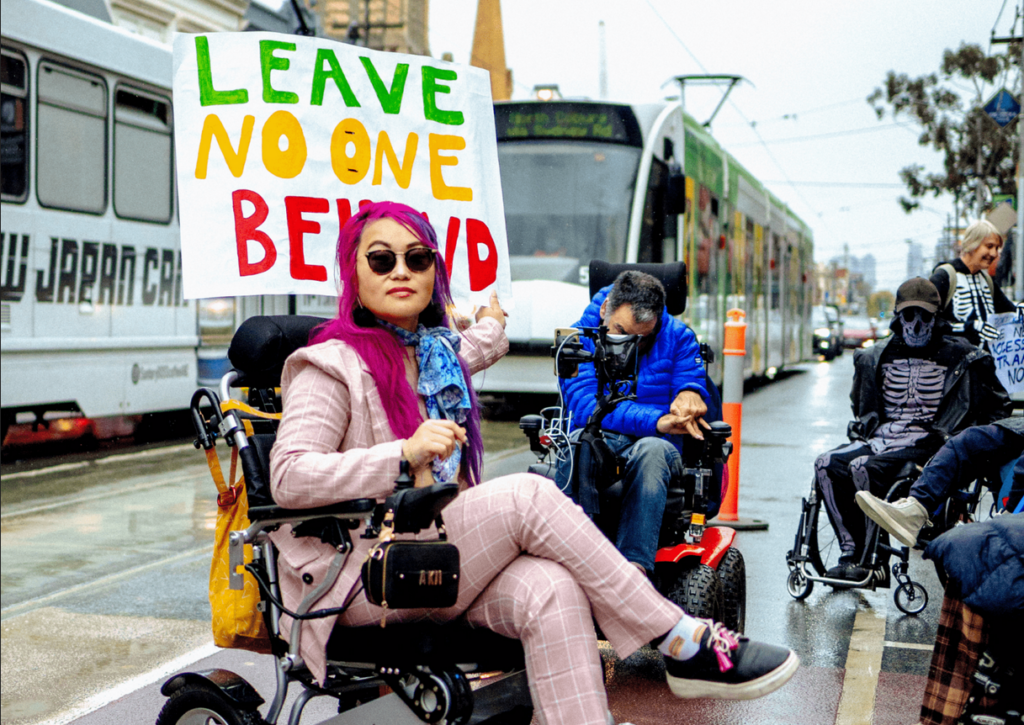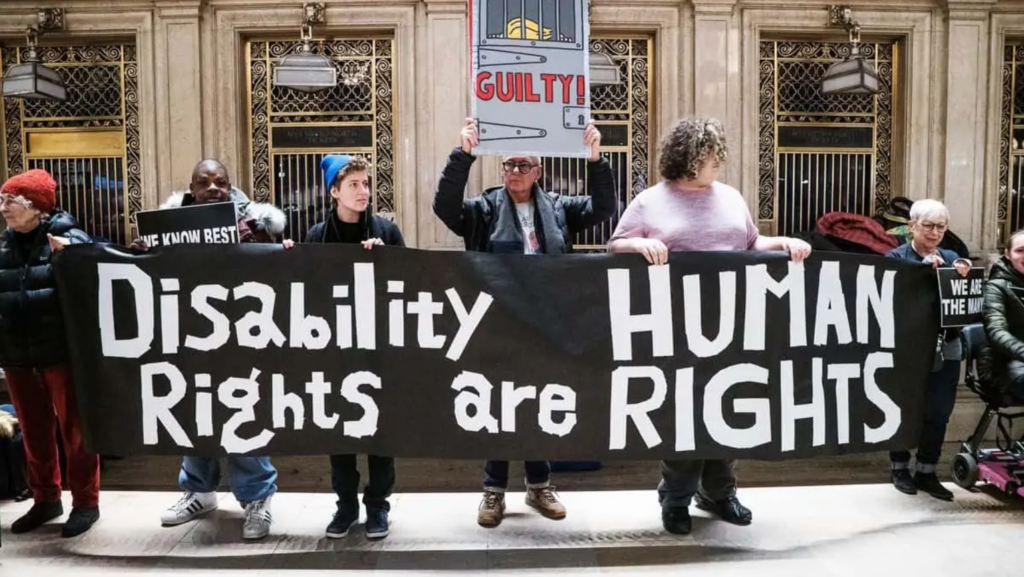Happy Labor Day. New developments call for action.
On this Labor Day, Out Of Exile_IDR gives thanks and honor to workers, and the unions that protect them. Without unions, the experience of many workers may be similar to that of people with disabilities. This piece will focus on the exploitation and abuse of disabled workers by employers, and how it’s perfectly legal under federal and state laws in the US. I’ll also be touching on the upcoming war in Washington, that could finally change that.
Section 14c of the US Department of Labor’s “Fair Standards Labor Act” (FSLA), has been virtually unchanged since it was enacted in 1938. Under the almost century old regulation, employers can apply for a certificate, which allows them to pay workers with disabilities, an unspecified subminimum wage. After a 2023 review by the DOL of section 14c, the battle against disability subminimum wage is about to begin.
According to the US DOL’s ” Fact Sheet 39A: Fair Labor Standards Act section 14c… some of the establishments that can obtain a certificate, allowing them to financially exploit disabled workers, include:
- Community rehabilitation programs (CRP) or workcenters
- Hospital or residential care facility (patient workers)
- School-work experience program (SWEP)
- Business – A for-profit employer
As for what types of “care” facilities can pay disabled individuals subminimum wages, the DOL fact sheet says: “A facility that primarily provides residential care for individuals with disabilities, including nursing homes, intermediate care facilities, assisted living facilities, halfway houses, and residential substance abuse treatment facilities. Such an employer may hire a worker with a disability who receives inpatient or outpatient treatment or care, often referred to as a “patient worker.” Certificates may be issued for a two-year effective period.”
For businesses that want to fill their coffers by taking advantage of disabled workers, the “Fair” standards fact sheet states: “A for-profit employer… (can employ) …workers with disabilities at a subminimum wage based on the individual’s productivity for the work performed. Certificates may be issued for a one-year effective period”.
The average sub wage, and the number of disabled people seemingly exploited by this legislation, seems to vary among the sources linked below. By any account, even one person with disabilities being preyed upon in this way, is far too many. The wages are inhumane. A 2021 Forbes article claims over 320,000 disabled workers, the majority with invisible disabilities, earn an average of $3.34 an hour. A previous Forbes article put the figures in excess of 420,000 people being paid as little as $2.15, while others cite drastically lower wages.
Some organizations, like Goodwill, form their own “sheltered workshops”, determining their own limits on sub wages for their disabled workers. There seems to be no bottom limit on how little individuals with invisible disabilities can be paid. “The non-profits use “time studies” to calculate the salaries of Section 14c workers. With a stopwatch, staff members time how long it takes a disabled worker to complete a task. That time is compared with how long it would take a person without a disability to do the same task. The non-profit then applies a formula to calculate a rate of pay, which may be equal to or less than minimum wage”.
A decade ago, NBC reported that Goodwill industries, presumably by authority of their DOL “Section 14c certificate”, paid disabled workers twenty-two cents an hour. The report claims that some were paid as little as three or four cents an hour. Think about paying your bills 10 years ago on a wage like that. Some nonprofits, even place Section 14c workers in outside, for-profit endeavors in restaurants, stores and even, “IRS centers”. That sounds more like calculated corporate and government exploitation, rather than accommodation, equality and “Goodwill” for the disabled community. Though the NBC “Goodwill” article and figures are old, the problem is older, and still continues today. Approximately 28% of US population have disabilities, a demographic too large to be ignored.
The theory of sheltered workshops is to prepare individuals with disabilities to transition to outside employment. In Missouri, disabled workers packaging T-shirts, or sorting and counting dog treats to be sold on Amazon, rarely “graduate” these workshops into regular paying jobs. It’s infuriating to think, that disabled people are being paid $1.50 an hour to sort $15 Amazon dog treats, while Jeff Bezos builds rocket ships. Do you suppose, anyone claiming support for disability rights and economic justice, will stop buying dog treats from Amazon?
I’m certainly no legal scholar, but the very reason the law allows this; because people have disabilities, seems to be an obvious violation of the ADA. The title of the recent ProPublica article linked below, says it all. “Missouri Allows Some Disabled Workers to Earn Less Than One Dollar and Hour. The State Says It’s Fine If That Never Changes”. To that, I say, “show me” change in the “Show-Me State” and across the country.
In a follow-up to that story by ProPublica, some participants of sheltered workshops said they approved, citing the alternative, is to sit at home and do nothing. Are these opinions formed as a result of years of gas lighting and oppression being accepted as “just the way it is”? It’s time for new attitudes and alternatives for the disabled community when it comes to wages and employment, and time for action from everyone.
In some places across the US, action has already been taken. About 16 states have changed or passed laws regarding disability subminimum wage exploitation but, nothing to speak of federally. A four year old press release from the National Council on Disability that “Applauded the US commission on civil rights call to repeal section 14c”, seems to be the sum of that effort. If you live in any of the states that have actions in progress, let your representatives know how you feel. Follow the “”legislation watch” APSE link to track progress. The Alternative? Similar actions introduced in Kentucky and West Virginia died in committee, allowing this despicable injustice against disabled people in those states to continue.

Is Change Coming?
If you’re a nondisabled white-collar worker, changes already here, in the form of new protections that took effect for you, on July 1, 2024. Under the DOL’s new rule, the salary threshold requirements will change as follows: “Effective July 1, 2024, the minimum salary threshold for employees classified as “exempt” under the “white collar” exemptions will increase to $844 per week ($43,888 annualized). For highly compensated employees, minimum compensation threshold will increase to $132,964 per year, where at least $844 per week must be paid on a salary or fee basis.”
In contrast to this action, for hungry disabled people living in poverty and being paid a couple of dollars an hour, there have been no substantial changes to protect them. Without the support of everyone, it’s likely to remain that way. Forgive my candor, but writing Alt text or encouraging others to, is not advocacy, it’s basic human decency to the blind community. Standing up for issues like this, affecting every disabled person in the country’s ability to be independent, to eat, and to live indoors… now that’s advocacy. What will you do?
August 30, 2024: According to the Washington Post on Friday, President Biden has “declined to take action for most of his presidency” on his 2020 campaign promise to phase out FLSA 14c programs. Recently, however, “Biden’s Department of Labor has submitted a rule for review by the White House Office of Management and Budget”, which could trigger a “massive legal and political battle” to end the oppression, permitted by this regulation.
Disability rights groups and some Congressional policymakers see the wording of the law differently. A 2023 memo sent to Julie Su, acting US Secretary of Labor, presents the legal argument that the Fair Labor Standards Act (FLSA), gives the Secretary “full discretion” to phase out the program, “without an act of Congress”. How much authority she has to do so, is uncertain, as are any possible attempts to block such efforts; in Congress, or through SCOTUS.
The DOL “rule being developed”, is expected to call for more stringent reporting and enforcement. It could be “…the regulatory equivalent of abolition” of FLSA 14c disability wage exploitation, according to Seth Harris, former acting Labor Secretary and Deputy Labor Secretary under Obama. Any plan set forth would require a review by the Office of Management and Budget and undergo a protracted public comment period. Does any of that make anyone else want to contact their congressman, or write DOL Secretary Su a letter? The Office of the Secretary Leadership Team” contacts are linked below
Under this archaic law, hospitals that may charge disabled, and other patients, as much as $25 for an aspirin, can further increase their profit margin, by literally, “using” disabled workers. Billionaire, and other business owners seem to enjoy the same unjust benefit. Far too often in these scenarios, people with disabilities are isolated in sheltered workshops for years, and sometimes “contracted out” by nonbusiness certificate holders, to for-profit businesses, like Amazon. Not only is it financial exploitation, but a seeming denial of community integration, as outlined in the Americans With Disabilities Act (ADA). I can’t $ee any reason why the FL$A $hould not be amended or repealed to $top this exploitation. Do you $ee one?
Alt text: For the blind community, the letter “S” was replaced by “$” in the previous statement for effect, suggesting that money is likely the reason this unfair regulation has not been changed. It reads: I can’t see any reason why the FLSA should not be amended or repealed to stop this exploitation. Do you see one?”
OutOfExile_IDR™ – © 2024

All writings, images, graphics, logos, and other content by: OutOfExile_IDR™ unless credited otherwise.
All Rights Reserved. No Scraping.
Featured Image (top) – Courtesy of: Barbara Alper/Getty Images
